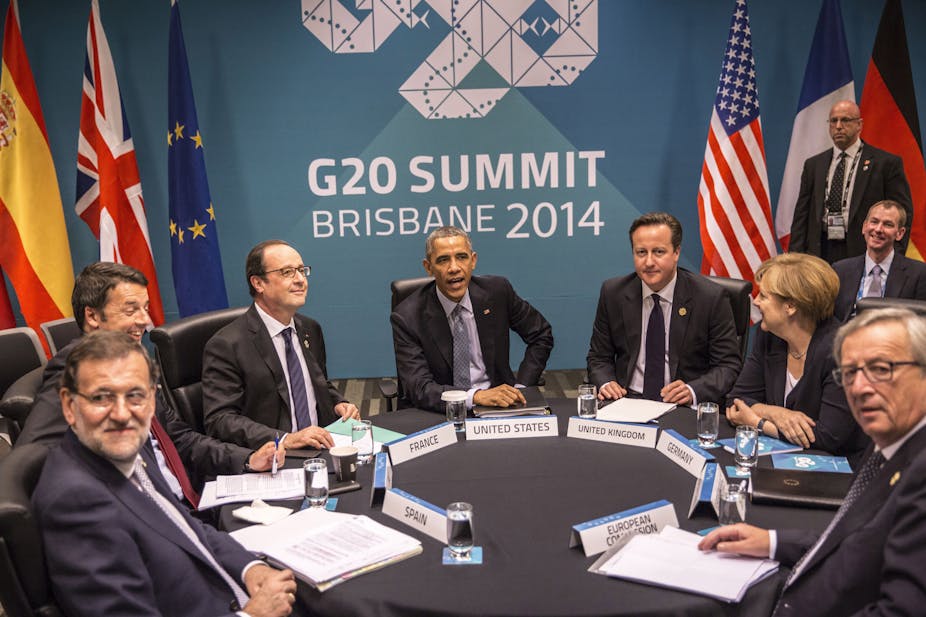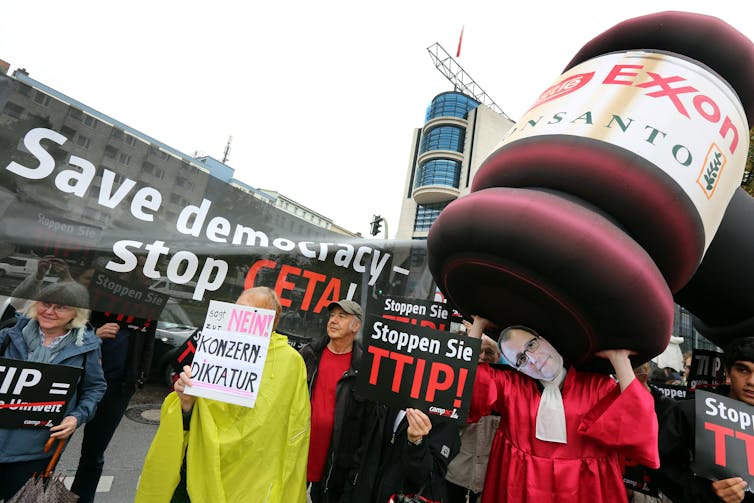
Christopher Bovis ne travaille pas, ne conseille pas, ne possède pas de parts, ne reçoit pas de fonds d'une organisation qui pourrait tirer profit de cet article, et n'a déclaré aucune autre affiliation que son organisme de recherche.
University of Hull apporte un financement en tant que membre adhérent de The Conversation UK.
Voir les partenaires de The Conversation France

The Transatlantic Trade and Investment Partnership, or TTIP, will be the world’s biggest free trade agreement. It is geared toward increasing trade between the EU and the US by opening various markets currently restricted in access or closed by tariffs or regulatory barriers. These include everything from pharmaceuticals, chemicals and energy to food, drink and clothing.
Together the US and EU account for around €22 trillion in annual trade, almost half of the world total. By opening trade further, this could boost global GDP by 0.6% a year or more if knock-on effects on productivity are included. And the effects would be even bigger if the deal eliminates permanent trade barriers, such as customs and taxes, which is also being negotiated.
Currently EU and US businesses pay trade tariffs to sell their products in each other’s markets. TTIP would remove these. It would also reduce costs from duplication, where businesses must meet US and EU standards that are often similar but different.
The exact increase in revenues that the deal will bring to specific economies has been debated. Estimates predict that a TTIP deal could increase the size of the EU economy by as much as €120 billion (0.5% of GDP) and the US economy by €95 billion (0.4% of GDP). Supporters on each side emphasise the size of the markets they will be opening up to domestic manufacturers – the EU will gain easier access to 300m American consumers and vice versa.
But what is the full potential of a free trade agreement between the USA and the EU? This will emerge after the deal is concluded and it is revealed who the winer and losers will be.
The two biggest obstacles in the ongoing TTIP negotiations relate to the sensitive areas of businesses which verge towards the realms of public policy.
Public services and procurement
Public authorities are major consumers in both Europe and the US. In the EU they spend around €2 trillion annually, equivalent to some 19% of the EU’s GDP delivering public services. The US Federal procurement spending is approximately US$500 billion per year. Companies on either side want fair access to these markets.
In the UK there are fears that this could put the NHS at risk of US competition. UK ministers and the European Commission have both made guarantees that TTIP would not affect how NHS services are provided, however.
Energy markets and renewable sectors
This is a market in excess of €950 billion annually. TTIP will add liquidity and competition to the energy market, benefiting both EU and US consumers. With renewable energy sources in TTIP negotiations focusing on shale gas, there is the potential for US companies benefiting, as they are already a generation ahead of their EU competition.
Global standards
The most ambitious objective of TTIP is the establishment of global standards in manufacturing products. If progress is achieved towards such objectives, both EU and US will be winners in liberalising trade.
Certain sectors, such as chemicals and pharmaceuticals will benefit from adopting common standards and authorisation processes. EU firms and the EU pharma sector is expected to gain some advantages over the USA competitors, but such advantages could be easily counteracted by public expenditure on health and the processes which relate to intellectual property rights of specialised drugs.
There is more controversy over other areas such as food safety where the US and EU have different standards. Critics argue that the EU has much stricter regulations on GM crops, pesticide use and food additives. They say TTIP could open the EU market to cheaper but poorer quality food.

Democracy and transparency
TTIP negotiations have been criticised for their lack of transparency, with discussions taking place behind closed doors in utmost secrecy.
TTIP also has provisions for introducing “investor-state dispute settlement”. This would allow companies to sue foreign governments over claims of unfair treatment, which is detrimental to their profits. Critics say this undermines democracy by giving large companies power to pressure government policies.
Needless to say TTIP is a huge trade agreement and many of the specifics are yet to be agreed upon. Negotiations started in 2013, but the US at least is determined to close the remaining rounds of negotiations before the term of the current presidency. In the EU, the European Council and the European Parliament must both agree to the outcome of negotiations. The deal must then be separately ratified by the national parliaments of all 28 EU member states.